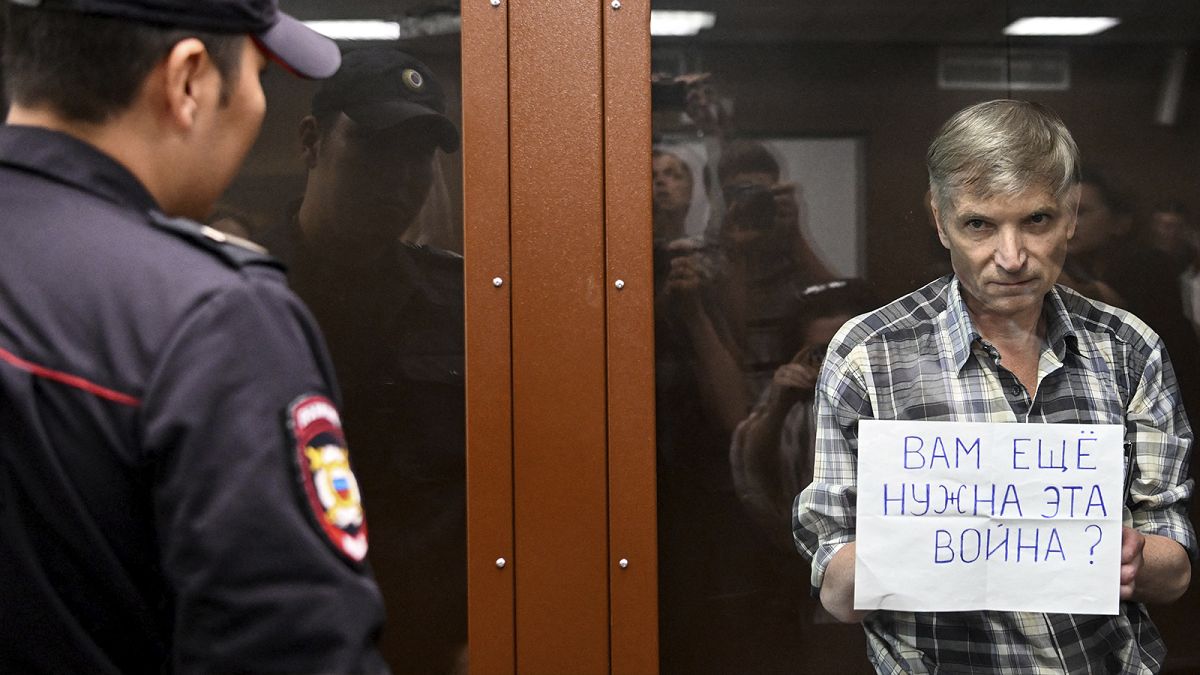Gorinov is the first to be sentenced of at least 50 other Kremlin critics and activists put on trial for speaking out against Russia's invasion.
Moscow city councillor Alexei Gorinov was sentenced to seven years in prison on Friday for denouncing Russia's war in Ukraine.
Gorinov was found guilty of "disseminating clearly false information" about the Russian military using his "official duties" and doing so as part of an organised group motivated by "political hatred", according to Judge Olesya Mendeleyeva.
"The defendant's rehabilitation is impossible without a sentence of deprivation of liberty," the magistrate said before sentencing him to seven years in a penal colony.
Before she handed down the sentence, the trial audience applauded the defendant, leading to the expulsion from the courtroom of spectators who had come to support him.
The 60-year-old Gorinov's sentencing came in the midst of a wave of repression to silence any criticism of Russia's war.
Since Kremlin's forces invaded Ukraine on 24 February, the authorities have passed a series of laws to punish with heavy penalties those who publicly condemn the attack, banning the use of the words "war" and "invasion".
Gorinov is the first opposition politician to receive a prison sentence for his stance against Russia's war, but at least 50 other activists and critics of the Kremlin are currently awaiting trial in detention.
Shortly before sentencing, standing in the glass cage reserved for the accused, the grey-haired man, with a tense face and piercing gaze, held up a sheet of paper for the cameras with the words "You still need this war?"
Another city councillor, Elena Kotenochkina, is accused of the same offence, but she is not on trial because she has fled Russia -- like many opposition activists -- because of the repression that has increased in Russia in recent months.
A lawyer by training, Gorinov was arrested in April for denouncing Moscow's "war" and "aggression" against Ukraine on 15 March during a meeting of his local municipal assembly, which was filmed and posted on YouTube, and which the court found to be aggravating circumstances.
Together with Kotenochkina, Gorinov objected to the council's idea to hold a children's dancing festival and art competition, stating that "children were dying" in neighbouring Ukraine.
"All efforts of civil society must be used to end the war and to bring about the withdrawal of Russian forces from Ukrainian territory," he said.
'Against all wars'
On Thursday, during his trial, Gorinov insisted that he was "against all wars", stressing that his father had "returned from the World War II as an invalid".
He also openly named Ukrainian towns such as Bucha where Russian forces are accused of war crimes, which the Russian authorities describe as lies or staged events.
"Bucha, Irpin, and Hostomel. Do these names mean anything to you? You, the accusers, should be interested in that, and you cannot say later that you did not know anything" about the crimes committed there, Gorinov said.
Gorinov has been in prison in Moscow since 26 April.
Since late February, dozens of people who have publicly criticised the offensive against Ukraine have been prosecuted in Russia.
Most have been fined, but others face heavy prison sentences, including Vladimir Kara-Murza, one of the few opposition figures left in Russia.
Another example is Alexandra Skochilenko, a St Petersburg artist who has been in prison since April and is awaiting trial for putting up anti-war labels in a store.
Russia, which has already been engaged in a long-running crackdown on voices critical of the Kremlin, has considerably toughened its arsenal of criminal offences aimed at silencing or punishing those who speak out against Putin and the government.
This week, the Duma, the lower house of parliament, passed a series of loosely-defined crimes punishable with prison sentences to crack down on calls for action against its security or "confidential" cooperation with foreigners.
Since the beginning of its war on Ukraine, Russia has also shut down or blocked access to many domestic and foreign media outlets as well as some of the biggest social networks, such as Twitter, Facebook and Instagram.
